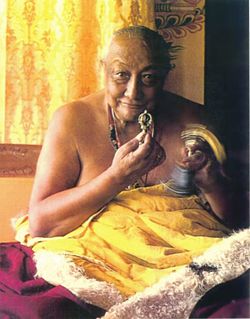A Quote by Dalai Lama
The most important benefit of patience consists in the way it acts as a powerful antidote to the affliction of anger - the greatest threat to our inner peace, and therefore our happiness. The mind, or spirit, is not physical, it cannot be touched or harmed directly. Only negative thoughts and emotions can harm it. Therefore, only the corresponding positive quality can protect it.
Quote Topics
Acts
Affliction
Anger
Antidote
Benefit
Cannot
Consists
Corresponding
Directly
Emotions
Greatest
Greatest Threat
Happiness
Harm
Important
Inner
Inner Peace
Mind
Most
Negative
Negative Thoughts
Only
Our
Patience
Peace
Physical
Positive
Powerful
Protect
Quality
Spirit
The Most Important
Therefore
Thoughts
Thoughts And Emotions
Threat
Touched
Way
Related Quotes
There are only two emotions: love and fear. All positive emotions come from love, all negative emotions from fear. From love flows happiness, contentment, peace, and joy. From fear comes anger, hate, anxiety and guilt. It's true that there are only two primary emotions, love and fear. But it's more accurate to say that there is only love or fear, for we cannot feel these two emotions together, at exactly the same time. They're opposites. If we're in fear, we are not in a place of love. When we're in a place of love, we cannot be in a place of fear.
As human beings we all want to be happy and free from misery.
We have learned that the key to happiness is inner peace.
The greatest obstacles to inner peace are disturbing emotions such as
anger and attachment, fear and suspicion,
while love and compassion, a sense of universal responsibility
are the sources of peace and happiness.
In this life, we are in a constant search for inner peace. We long for it in all aspects of our lives, both personally and professionally. The truth is that we cannot have inner peace without balance. It seems that having too much or too little of anything completely throws off our balance, therefore limiting our inner peace.
Patience-the ability to put our desires on hold for a time-is a precious and rare virtue. We want what we want, and we want it now. Therefore, the very idea of patience may seem unpleasant and, at times, bitter. Nevertheless, without patience, we cannot please God; we cannot become perfect. Indeed, patience is a purifying process that refines understanding, deepens happiness, focuses action, and offers hope for peace.
Those who have little interest in spirituality shouldn’t think that human inner values don’t apply to you. The inner peace of an alert and calm mind are the source of real happiness and good health. Our human intelligence tells us which of our emotions are positive and helpful and which are damaging and to be restrained or avoided.
An affectionate disposition not only makes the mind more peaceful
and calm, but it affects our body in a positive way too. On the
other hand, hatred, jealousy and fear upset our peace of mind, make
us agitated and affect our body adversely. Even our body needs peace
of mind and is not suited to agitation. This shows that an
appreciation for peace of mind is in our blood.
To enter upon the marriage union is one of the most deeply important events of life. It cannot be too prayerfully treated. Our happiness, our usefulness, our living for God or for ourselves afterwards, are often most intimately connected with our choice. Therefore, in the most prayerful manner, this choice should be made.
Creationists argue that natural selection is only a negative process, and therefore cannot create anything. Chopra argues that skepticism is only a negative process, and therefore does not lead to knowledge. Both are wrong for the same reasons. They ignore the generation of diversity and new ideas upon which natural selection and skepticism acts. Weeding out the unfit is critical to both - natural selection allows evolution to proceed, and skepticism allows science to advance.
Sensory experience does not offset the intense pain or pleasure we feel on a mental level; it may distract us, but doesn't overcome it. On the other hand, if we have peace of mind, even negative experiences do not upset us. Peace of mind is also good for our physical health. Medical experts have found that anger, hatred and fear eat into our immune system. Being calm and relaxed is better for our physical well-being.
To me, then, true criticism consists in trying to find out the intrinsic worth of the thing itself, and not in attributing a quality to that thing. You attribute a quality to an environment, to an experience, only when you want to derive something from it, when you want to gain or to have power or happiness. Now this destroys true criticism. Your desire is perverted through attributing values, and therefore you cannot see clearly. Instead of trying to see the flower in its original and entire beauty, you look at it through coloured glasses, and therefore you can never see it as it is.

































